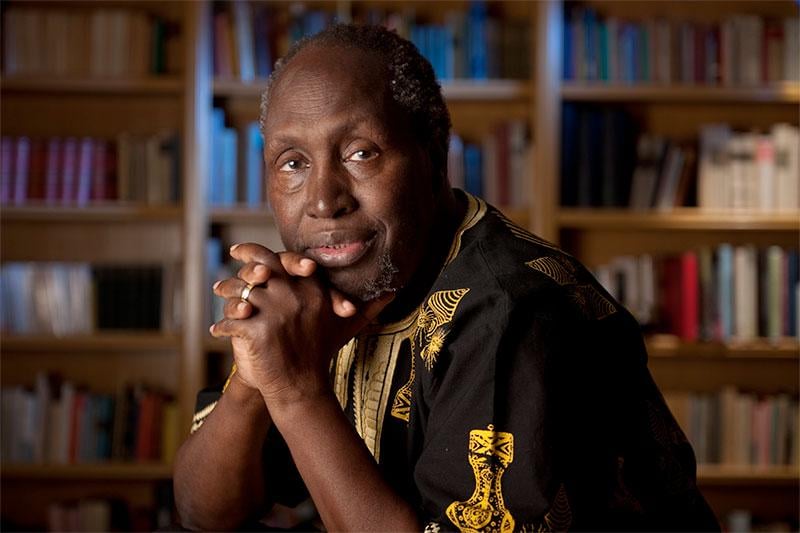Ngugi wa Thiong’o, born James Ngugi on January 5, 1938, is a literary giant hailing from Kenya whose works have left an indelible mark on the world of African literature. His journey from the humble beginnings in Kamiriithu, Kenya, to becoming a renowned author, essayist, playwright, and literary critic is a testament to his unwavering dedication to shedding light on the African experience. Renowned for his exploration of themes such as colonialism, postcolonialism, and the struggles faced by Africans, Ngugi wa Thiong’o’s impact transcends borders and generations.
Growing up in a large family, Ngugi wa Thiong’o’s educational path shaped his future as a literary icon. Educated in mission-run schools and later at Makerere University College in Uganda and the University of Leeds in England, his academic journey laid the foundation for his profound understanding of the complexities of colonialism and its lasting effects on African societies. It was during this period that he made a significant decision to reclaim his identity by changing his name from James Ngugi to Ngugi wa Thiong’o, symbolizing his resistance against colonial influences and embracing his Kenyan roots with a traditional Kikuyu name.
In the realm of literature, Ngugi wa Thiong’o made a grand entrance onto the literary stage with the performance of his play “The Black Hermit” in 1962, captivating audiences with his poignant storytelling and thought-provoking narratives. His novels “Weep Not, Child” (1964) and “The River Between” (1965) further solidified his position as a literary luminary, delving into themes of colonialism, the Mau Mau Uprising, and the quest for independence in Kenya. Through his works, he not only chronicled historical events but also highlighted the societal challenges faced by Kenyans post-independence, advocating for decolonization and the preservation of African languages in literature.
Ngugi wa Thiong’o’s literary prowess extended beyond borders, with his works being translated into numerous languages, emphasizing the universal appeal and relevance of his narratives.
His commitment to writing in his native Kikuyu language underscored his belief in the power of indigenous languages to convey authentic African experiences, challenging the dominance of colonial languages in literature and fostering a sense of cultural pride among African writers and readers alike.
However, Ngugi wa Thiong’o’s literary journey was not without its trials. His outspoken views and criticisms of the regime led to his imprisonment in Kenya, forcing him into exile first in England and later in the United States. Despite the adversities he faced, he remained steadfast in his commitment to advocating for African self-determination and denouncing the remnants of colonialism that continued to plague his homeland and the continent at large.
Among his notable works are “A Grain of Wheat” (1967), “Petals of Blood” (1977), “Devil on the Cross” (1982), and “Decolonizing the Mind: The Politics of Language in African Literature” (1986), each piece a powerful reflection of his unwavering dedication to addressing pressing social and political issues through the lens of literature. “Wizard of the Crow” (2006) stands as a testament to his enduring legacy as a prolific writer who fearlessly tackled complex themes with nuance and depth.
One of Ngugi wa Thiong’o’s most remarkable achievements is the short story “The Upright Revolution: Or Why Humans Walk Upright” (2019), which holds the distinction of being the most translated short story in the history of African writing, with versions in over 100 languages. This feat not only speaks to the universal appeal of his storytelling but also solidifies his position as a literary trailblazer whose words resonate across cultures and generations, transcending linguistic barriers.
In the wake of Ngugi wa Thiong’o’s passing at the age of 87, the literary world mourns the loss of a visionary whose contributions have left an indelible mark on African literature and beyond. As readers and scholars reflect on his legacy, it becomes evident that his works will continue to inspire and provoke critical conversations on the enduring impacts of colonialism, the importance of indigenous languages in literature, and the quest for true decolonization in the African literary landscape.
Ngugi wa Thiong’o’s life and work serve as a poignant reminder of the power of storytelling to challenge oppressive systems, ignite social change, and preserve the rich tapestry of African experiences for generations to come.
His unwavering dedication to amplifying marginalized voices, advocating for cultural authenticity, and promoting African languages stands as a beacon for aspiring writers and activists seeking to make a difference through the written word.
As we bid farewell to Ngugi wa Thiong’o, we honor his legacy by continuing to engage with his works, amplify his messages, and uphold his vision of a literary landscape that celebrates the diversity, resilience, and beauty of African storytelling. In his memory, let us carry forward the torch of decolonization, linguistic empowerment, and cultural preservation, ensuring that his transformative impact reverberates far and wide, shaping the future of African literature and inspiring generations to come.

